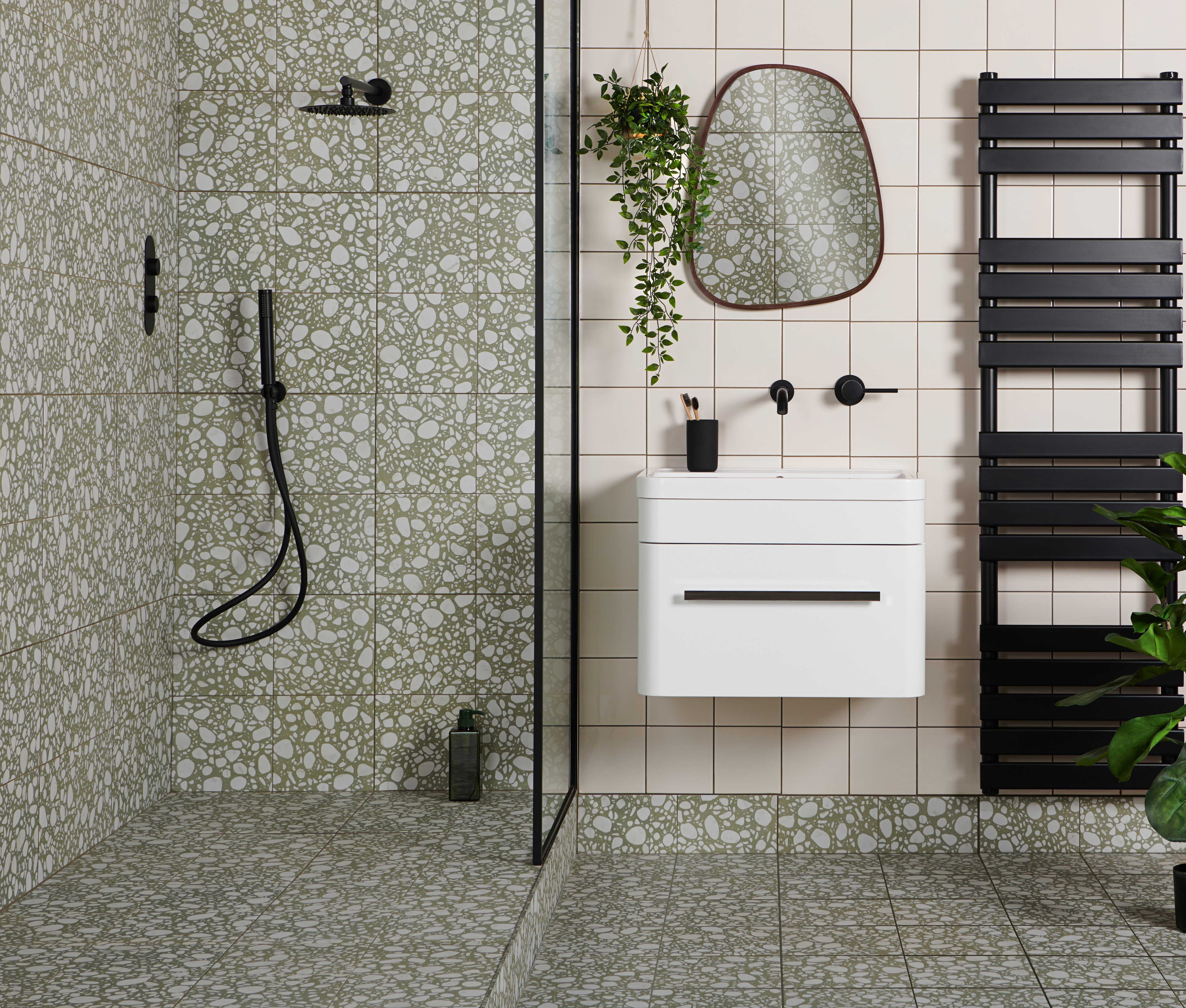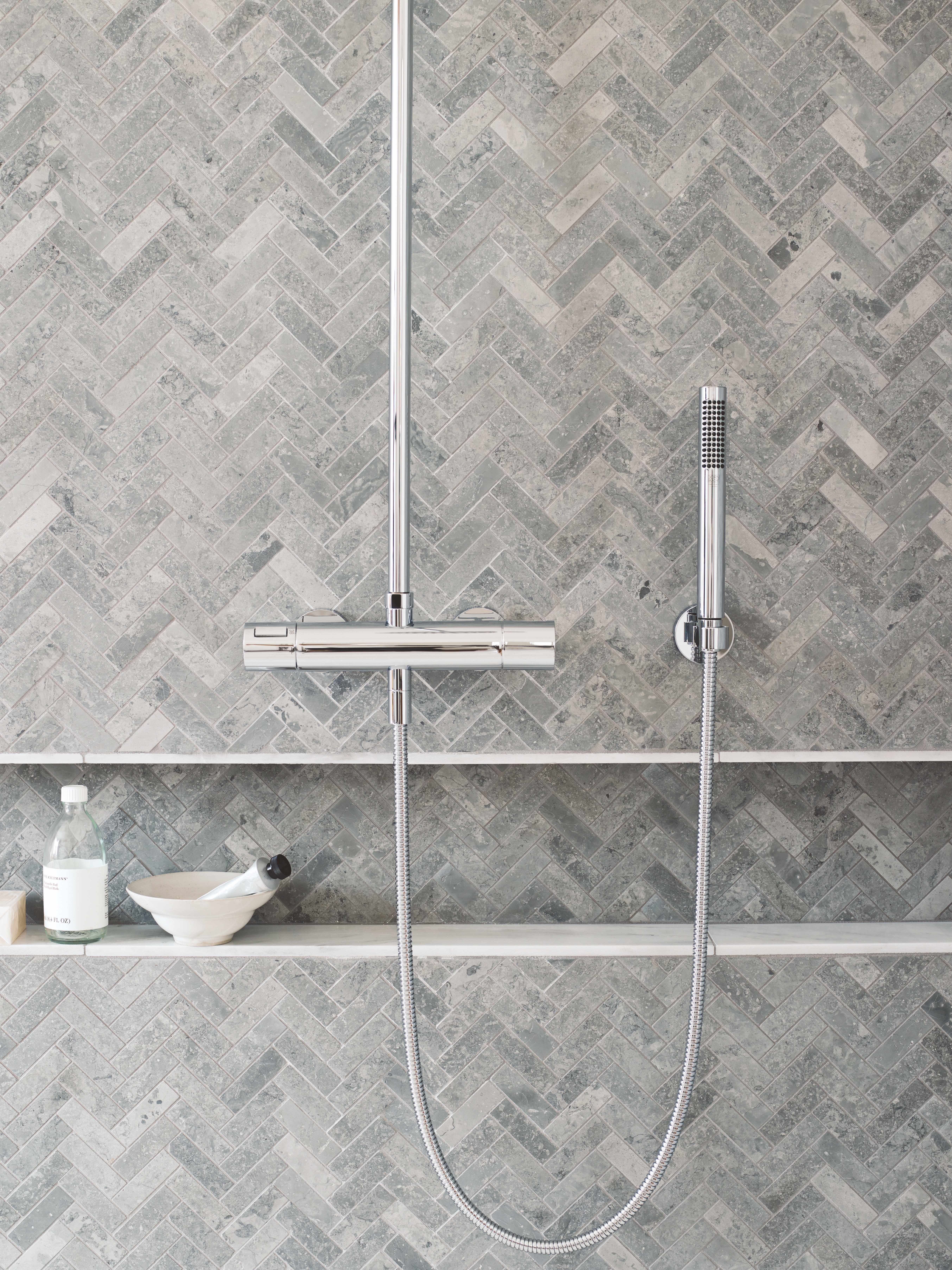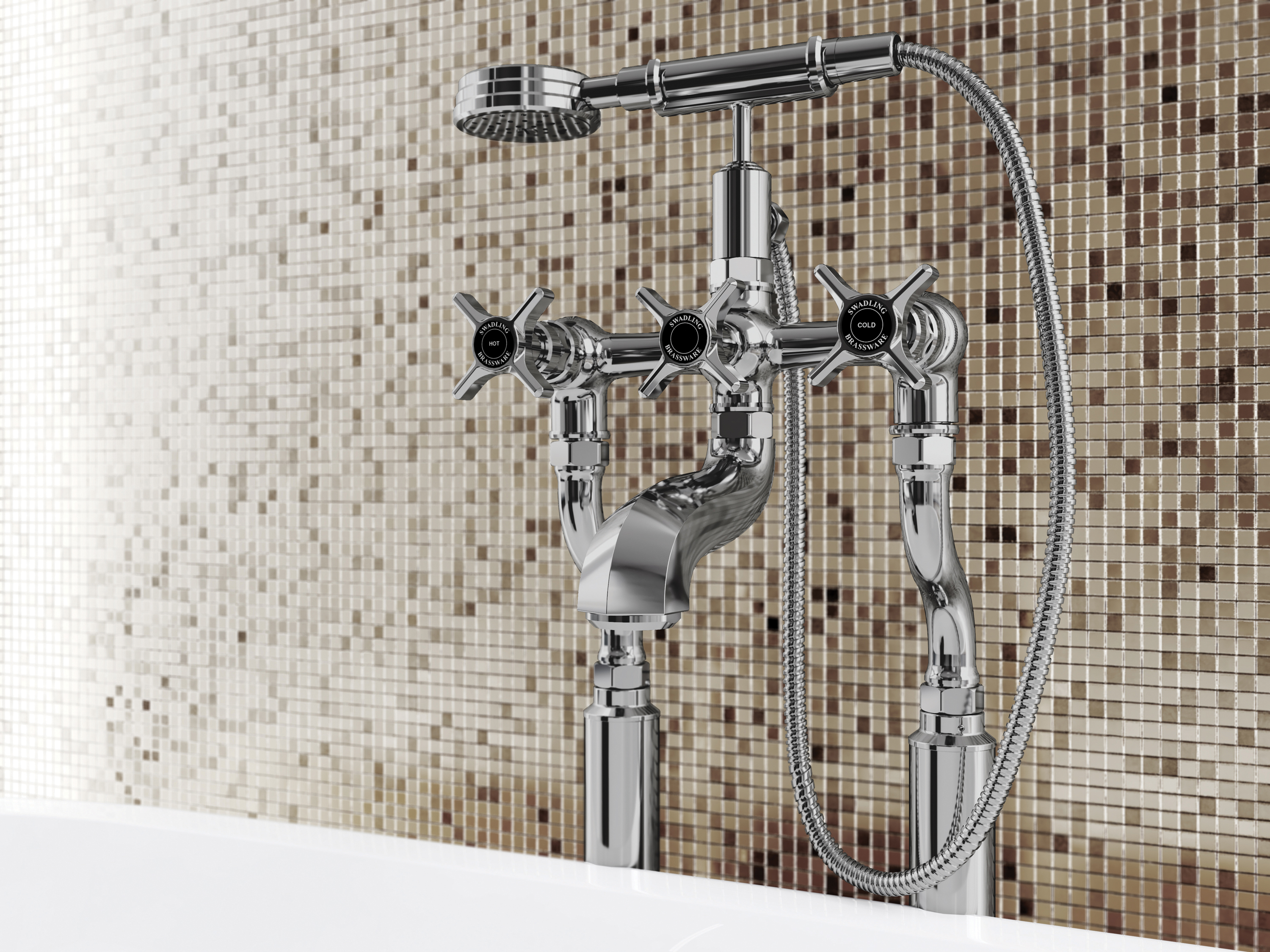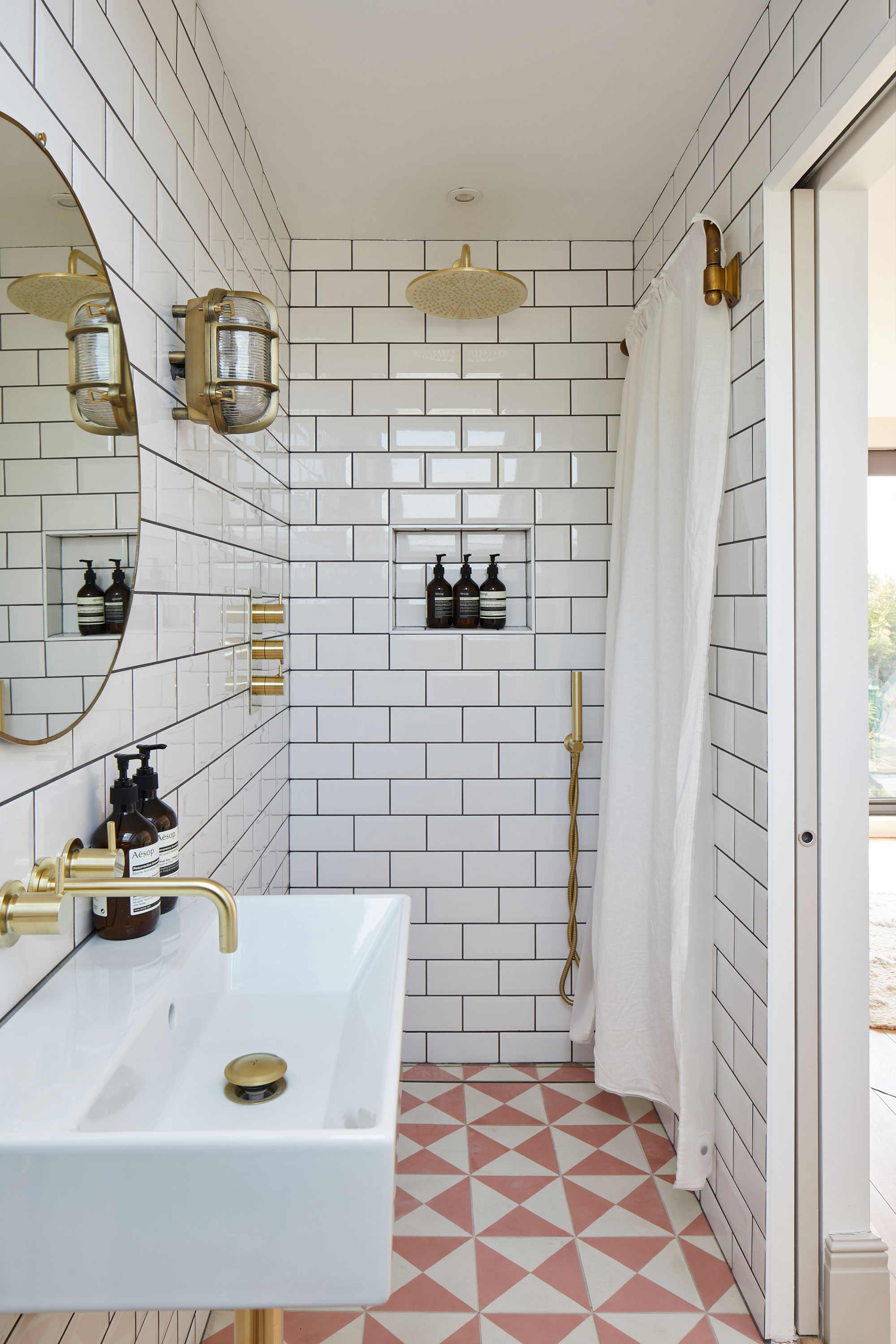How to clean a shower – plus tips to keep it clean
This is how to clean a shower properly using the best natural ingredients like vinegar and baking soda for a thorough clean from top to bottom


Every household should know how to clean a shower properly. Because grimy showers do not help with starting a day well, and aren't particularly hygienic, either. If you're scrubbing and scrubbing, and the limescale and mould are still there, you need our pro tips to banish them once and for all.
A vital part of knowing how to clean a bathroom, whether you're cleaning a shower with vinegar and baking soda or using stronger household cleaners, plus, it's not as lengthy or tough a job as it may seem...
How to clean a shower and keep it clean
The biggest challenges you may face are water marks, smeared tiles and moldy grout and we will help you tackle these in addition to a sluggish drain and a clogged shower head which can quickly ruin the showering experience also.
Keep scrolling for our quick guide of failsafe methods, plus some tips from favorite household cleaning experts that will leave your shower sparkling like it belongs in a luxurious health spa...
You will need:
- All purpose bathroom cleaner
- Rubber gloves
- Food grade powdered citric acid
- Soft toothbrush
- Microfiber cloth
- Empty spray bottle
- Cleaning white vinegar
- A shower squeegee
- Bicarbonate of Soda
1. Empty the shower
You'll find it much easier to clean your shower when there's nothing in it. Remove all shampoo bottles, razor blades and the like, in addition to any hair and debris caught in your shower drain.
2. Clean the shower tray
Spray your shower tray with an all-purpose bathroom cleaner and scrub clean using a scourer. Rinse with warm water and wipe dry using a soft microfibre cloth or paper towel. In hard-water areas use a limescale remover once a week.
Citric acid is also an (underrated) effective cleaning agent that's cheap and easy to use at home to achieve a clean shower. You will need to apply gloves to use it to avoid skin irritation, but basically, mix half a cup of food grade, powdered citric acid into a bucket of warm water, and clean everything in your shower: it's good for tiles, toilets, shower heads...It's equally effective for soap scum and limescale.
Get small space home decor ideas, celeb inspiration, DIY tips and more, straight to your inbox!
We spoke with the experts at the ethical cleaning company Bio-D who recommend for descaling your shower, 'If part of your shower is tiled, always wet your tiles with cold water to protect your joints, then spray on your descaler, scrub gently with a soft toothbrush and rinse thoroughly afterwards. For your shower screen, apply descaler, wipe with a soft cloth and then use a squeegee when you rinse to get rid of any leftover marks.'
3. Tackle any limescale with vinegar
For eco-friendly cleaning white vinegar is brilliant for putting the sparkle back into your shower. Mix a solution of half water, half vinegar into an old spray bottle and spray on any limescale, leave for 15 minutes. Depending on how bad the problem is, you may need to use the rougher side of a non-scratch scouring pad and some elbow grease. Rinse off with warm water and buff dry with a cloth.

Don't forget to clean the tiles and grout surrounding your shower. This herringbone, subway tile design is by Fired Earth
4. Clean the grout between tiles
To clean tile grout with any mildew present, fill an empty spray bottle with an equal mix of white vinegar and water. Spray the whole area generously and allow the solution to soak in for 5 minutes. Brush back and forth over the affected grout with an old toothbrush or a grout brush like this one from Amazon. Rinse with warm water.
Then make a paste with two tablespoons of bicarbonate of soda and a few splashes of water. Dip your toothbrush or grout brush in the paste and work it into the grout. Spray the area with your vinegar and water solution. The vinegar will cause the baking soda to bubble up and will start to work away any mould or soap scum. Scrub the grout lines with your brush to remove build up, then rinse with warm water.
This method is fine on ceramic tiles but do not use vinegar if you have marble tiles and look for further guidance on how to clean bathroom tiles properly.

5. Clean the shower head
If your water flow isn’t as fast as it once was or there is water shooting around your shower in all directions, the holes in your shower head are probably clogged up.
One way to clean a shower head properly is to first use a toothbrush to quickly scrub of any dry debris from around the holes. Mix a solution of equal parts white vinegar and water (you'll need about ½ pint) and pour it into a plastic bag. Put the plastic bag around the shower head so the holes are submerged in the liquid. Secure the bag using an elastic band or a cable tie. Leave to soak for at least 20 minutes, or for best results leave overnight. Remove the bag, then use a scourer to wipe away loose sediment and finally run the shower on hot to flush out the holes.
6. Clean shower doors
It’s best to give your shower door a daily clean rather than an occasional deep clean. After every shower quickly mist with eco cleaner and wipe down with a clean cloth. Buy an inexpensive shower squeegee and use it every time you shower. The few seconds it takes you to do this will dramatically reduce the amount of soap scum build up, which you'll be aware of if you already know how to clean glass shower doors properly.
For stubborn grime use a mix of bicarbonate of soda and water. To get started use 8tbsp of bicarb and add enough water to mix into a thick paste. Using a nonabrasive sponge, scrub the glass. Rinse using a 50/50 white vinegar and water mixture in a spray bottle. Dry using your squeegee or paper towels.

A mucky shower enclosure will make the whole room look grubby so keep yours clean. This is the Arysto sliding door enclosure from Pure Bathroom Collection
7. Clean your shower curtain
Clean ugly mildew stains off a shower curtain (if you have one) by putting it and a few used towels into your washing machine. Add ¼ pint of your normal washing liquid and ¼ pint of bicarbonate of soda to the load. Wash it in warm water on your machine's regular cycle. Add ¼ pint of white vinegar during the rinse cycle. Let it drip-dry; don’t put it in a dryer.
Learn how to clean your shower curtain properly and to prevent mildew in the first place, regularly soak your shower curtain in a salt water bath for a few hours, let it dry, then rehang, this a chemical-free way to avoid mould.
- If you want any more tips on how to get rid of mould and mildew, check out our tips.

8. Clean your shower drain
It’s not pleasant to stand in dirty, lukewarm water because your shower’s drain has stopped working properly. In fact, a clean shower is always a well draining shower. The most likely clog culprit is hair, there is a simple way to fix this. If you're desperate, untwist a wire coat hanger and slide one end inside the drain to pull out any clumps of hair. Better still, use a contraption that's specifically designed to remove drain hair, such as a drain snake; or try a gel drain unblocker.
For a thorough clean, pour ¼ pint of bicarbonate of soda down the drain, followed by ¼ pint of white vinegar and cover the drain with a wet cloth. Let it bubble for ten minutes. Remove the cloth and rinse the drain with boiling-hot water straight from a kettle. And for more on how to unclog a shower drain take a look at our complete guide.
How to keep your shower clean
- Buy a sink strainer: Or drain catch to stop hair from clogging the plug hole.
- Use vinegar regularly: To prevent grout going mouldy spray your shower with a vinegar and water mix before you get out of the shower, two to three times each week will make a huge difference.
- Ventilate: Keep windows and doors open for 10 minutes after every shower or use an extractor fan to keep your bathroom well ventilated.
- Use your shower squeegee every day: Keep one handy so you can give the walls a quick wipe before stepping out of the shower.
- Avoid shutting the shower door: After showering always leave your shower door or curtain open; this prevents a humid atmosphere and stops mould growing. Also wipe down wet tiles with a plastic-bladed window wiper or squeegee to stop watermarks forming.
- Is your shower over a bath? This is how to clean a bathtub properly.
Your shower cleaning essentials
What's the best and easiest way to clean a shower?
'The easiest and fastest way to clean a shower is by rinsing the shower combined with a bathroom multipurpose cleaning spray. Using a bathroom cleaner, spray your walls and bathtub or shower walls. Then, rinse the surfaces down with water - either from your shower or cups of water - and dry the tiles with a towel,' explains Ollie Lyon, Resident DIY expert at Plumbworld.
'Always check to remove any hair from your shower or bathtub’s plug - hair can cause a blocked drain, leading to grime building up.'
What do professional cleaners use to clean showers?
Most professional cleaners use all-purpose cleaners and white vinegar because they are great for cleaning almost any surface if your home. We spoke to two household names to ask what the best ways to clean your shower.
Lynsey Queen of Clean advises to 'Clean the shower door and base thoroughly. I use my Karcher for the doors as its brilliant.' Then, 'Soak the shower in bleach and if it has lime scale, spray on some lime scale remover.' And finally, 'Make sure you clean the shower hose and the switches.'
Mrs Hinch's shower cleaning routine starts with, '1st step: spray down shower head and shower screen etc with Viakal! This is what gets rid of any limescale or annoying watermarks.'
How often should a shower be cleaned?
'You should aim to give your shower a thorough clean once a week and a deep clean once a month, with some quick and basic cleaning after every shower too.'
'Every time you shower, use a squeegee or a towel to wipe down shower walls and doors. Clear hair from the drain, and hang any shower accessories like sponges and loofahs to drip dry. This quick routine, which shouldn’t take you more than a minute each time, will keep you shower looking fresh for longer between deeper cleans.'
'Your weekly clean should include rinsing your shower walls and door and clearing the drain, and on a monthly basis, you should deep clean your shower walls, doors and shower head and wash your shower curtain, if you have one,' says Kerry Hale at Mira Showers.